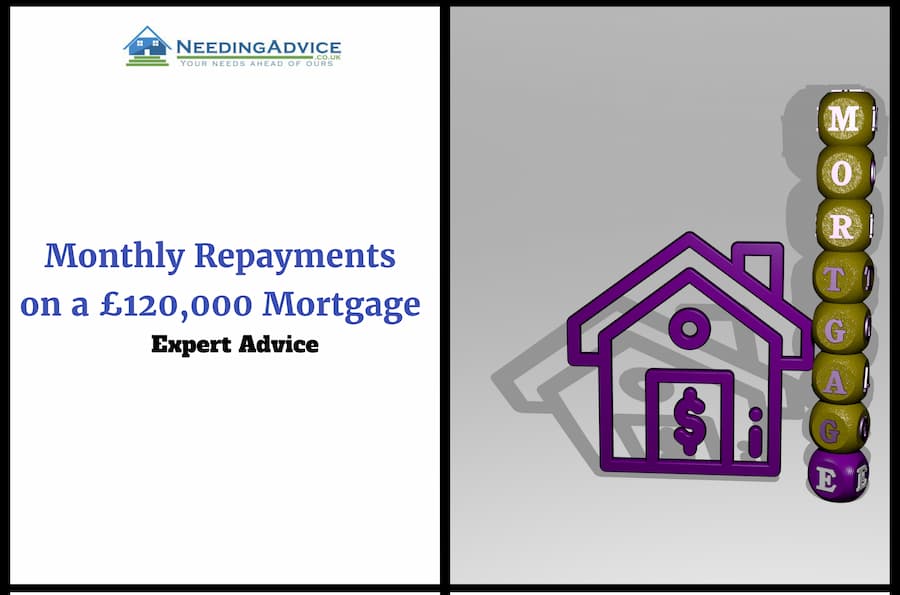How Much is a 120k Mortgage Per Month in the UK?
When considering a mortgage of £120,000 in the UK, potential homeowners often need a clear understanding of what their monthly repayments will look like. As of September 2024, the average monthly repayment on a £120,000 mortgage is around £702. This is based on a 25-year mortgage term, a 5% interest rate, and a capital repayment mortgage.
However, the exact monthly repayment amount can vary depending on several factors, including:
•Interest rate: Fluctuations in market conditions or personal credit history can affect the rate you’re offered.
•Mortgage term: Longer terms reduce monthly payments but increase the overall interest paid.
•Credit score: A better credit score could lower your rate and monthly repayments.
•Mortgage type: Whether you choose a repayment or interest-only mortgage significantly impacts monthly payments.
For example, a £120,000 mortgage with an interest-only option would have lower monthly repayments compared to a capital repayment mortgage. This is because, with an interest-only mortgage, the capital is not paid off, and only the interest is paid each month. This reduces monthly costs but leaves the loan principal untouched, meaning you’ll need a repayment vehicle or lump sum to clear the balance when the term ends.
To get a more precise figure tailored to your circumstances, it’s recommended to use a mortgage repayment calculator or consult with a mortgage broker or lender to assess various mortgage deals. This helps you find the best option based on your financial situation and specific needs.
Factors Affecting Monthly Mortgage Payments
Understanding the various factors that influence your monthly mortgage repayments is essential for managing your financial decision. From the interest rate to the mortgage term, every element plays a role in determining your mortgage balance. Let’s dive into the key aspects that can impact your monthly costs.
Interest Rate and Monthly Payments
The most significant factor affecting your monthly payment is the mortgage interest rate. Interest rates can vary depending on the current market conditions, your credit score, and whether you’re dealing with a fixed or variable rate deal.
•Current Market Conditions: The Bank of England’s base rateThe interest rate set by the Bank of England, affects the in... heavily influences mortgage rates in the UK. In times of low-interest rates, like during a financial downturn or post-credit crunch periods, borrowers can secure better mortgage deals. However, when the market recovers, and the base rate rises, so do mortgage interest rates, potentially increasing monthly mortgage payments.
•Fixed vs Variable Rates: A fixed-rate mortgage offers stability with a guaranteed interest rate for a set period, often resulting in predictable monthly payments. A tracker mortgage, on the other hand, follows the base rate, meaning your monthly payments can fluctuate with rate increases or decreases.
For example, on a £120,000 mortgage at a fixed 3% rate over a 25-year term, your monthly payment would be approximately £570. If you’re on a variable-rate mortgage, your payments may be lower or higher depending on market changes.
Term Length and How It Affects Monthly Payments
The length of the mortgage term plays a vital role in determining your monthly mortgage payments. In the UK, mortgage terms typically range from 15 to 30 years.
•Shorter Term: Opting for a shorter mortgage term, like 15 years, results in higher monthly repayments but a lower total interest paid over time. For instance, with a 15-year term at 3%, you could pay £828 monthly, saving on interest but straining monthly cash flow.
•Longer Term: A longer term (30 years) leads to lower monthly payments but higher total interest. A 30-year term on the same mortgage at 3% would result in monthly payments of about £505. However, over the life of the loan, you would pay significantly more in interest.
Choosing the right term length is critical for balancing your monthly financial obligations and your overall financial situation.
Repayment vs. Interest-Only Mortgages
There are two primary types of mortgages in the UK: repayment mortgages and interest-only mortgages. Your choice between these two will determine how much you pay each month and the structure of your debt repayment.
•Repayment Mortgage: This type of mortgage requires you to pay both the interest and a portion of the principal each month. Over time, you reduce the mortgage debt and eventually pay off the entire loan by the end of the term. Repayment mortgages are more popular due to their ability to fully clear the debt.
•Interest-Only Mortgage: With an interest-only mortgage, your monthly payment only covers the interest on the loan, leaving the principal untouched. This option is often used by buy-to-let landlords or those looking to keep monthly costs low temporarily. However, at the end of the term, the full mortgage balance will still need to be repaid.
The Role of Your Deposit in Mortgage Payments
The mortgage deposit you place down on a property significantly affects both the size of your mortgage and the mortgage rate you’ll receive. A larger deposit reduces the amount you need to borrow, lowering your monthly mortgage payments. Moreover, lenders typically offer cheaper interest rates to those with bigger deposits, reducing the overall cost of the mortgage.
•Deposit Size: In the UK, a deposit of at least 5% to 20% is standard. A larger deposit (e.g., 20%) not only cuts down your mortgage amount but may also lead to a lower interest rate. For example, if you put down a 10% deposit on a £120,000 mortgage, you’re borrowing £108,000, reducing your monthly mortgage repayments.
•LTV Ratio: The loan-to-value (LTV) ratio measures how much you’re borrowing compared to the property’s value. The lower the LTV, the better the interest rates offered by mortgage providers.
Additional Costs in Your Mortgage Journey
Aside from your monthly mortgage payments, there are other costs to consider when taking out a mortgage. Being aware of these will give you a clearer idea of the total monthly costs.
•Insurance and Valuation Fees: Mortgage providers require building insuranceInsurance that covers damage to the structure of a property.... to cover the structure of the home. Additionally, a valuation fee may be required to assess the property’s value, typically costing a few hundred pounds upfront.
•Mortgage Advisor Fees: Seeking advice from a CeMAP-qualified mortgage adviser can be beneficial when navigating the complex process of securing the best mortgage. Some brokers offer fee-free mortgage advice, while others may charge a fee for their professional services.
Impact of Credit Score on Mortgage Payments
Your credit score plays a critical role in securing competitive mortgage deals. Lenders check your credit history to assess how risky it would be to offer you a loan. The higher your credit score, the lower your mortgage interest rates, and vice versa.
•Good Credit: Borrowers with good credit can access lower interest rates, reducing their monthly mortgage payments. For example, those with a high credit score may receive a rate as low as 2%, saving thousands over the loan’s lifetime.
•Bad Credit: If you have bad credit, it could lead to bad credit mortgages with significantly higher rates. Specialist lenders offer options for those with less-than-perfect credit, but the monthly costs are higher due to increased interest rates.
The Importance of Income in Mortgage Approval
Lenders generally follow an income multiplier when assessing how much you can borrow. Most mortgage providers offer loans up to 4-4.5 times your annual income, though some specialist lenders may provide up to six times salary mortgages for certain buyers.
•Joint Mortgage: For couples applying together, the mortgage is often calculated based on the combined income. A joint mortgage can help increase borrowing capacity, allowing for more affordable monthly repayments.
•Proof of Income: Whether you’re salaried or self-employed, you’ll need to provide proof of income, such as bank statementsA record of a borrower's financial transactions often requir..., payslips, or tax returns, to meet eligibility criteria. Self-employed individuals might need to show income over several years to satisfy affordability checks.
FAQs
How does a higher deposit affect my mortgage payments?
A larger deposit reduces the total loan amount and can result in better interest rates, leading to lower monthly payments.
Can I switch from a variable rate to a fixed-rate mortgage?
Yes, many lenders allow you to switch mortgage products during your term, but you may incur fees for early repayment or changes.
How do I calculate my exact monthly mortgage repayments?
You can use a mortgage repayment calculator or speak to a mortgage broker to get precise estimates tailored to your financial situation.
What happens if my income changes during the mortgage term?
If your income changes, you should contact your lender. Some lenders offer flexible repayment options, but missing payments can harm your credit score and lead to mortgage arrears.
Can I make overpayments on my mortgage?
Yes, many mortgages allow for overpayments, which can reduce your overall mortgage balance and help you pay off the loan faster.
Are there mortgages for people with bad credit?
Yes, specialist lenders offer bad credit mortgages, but they typically come with higher interest rates and stricter terms.







